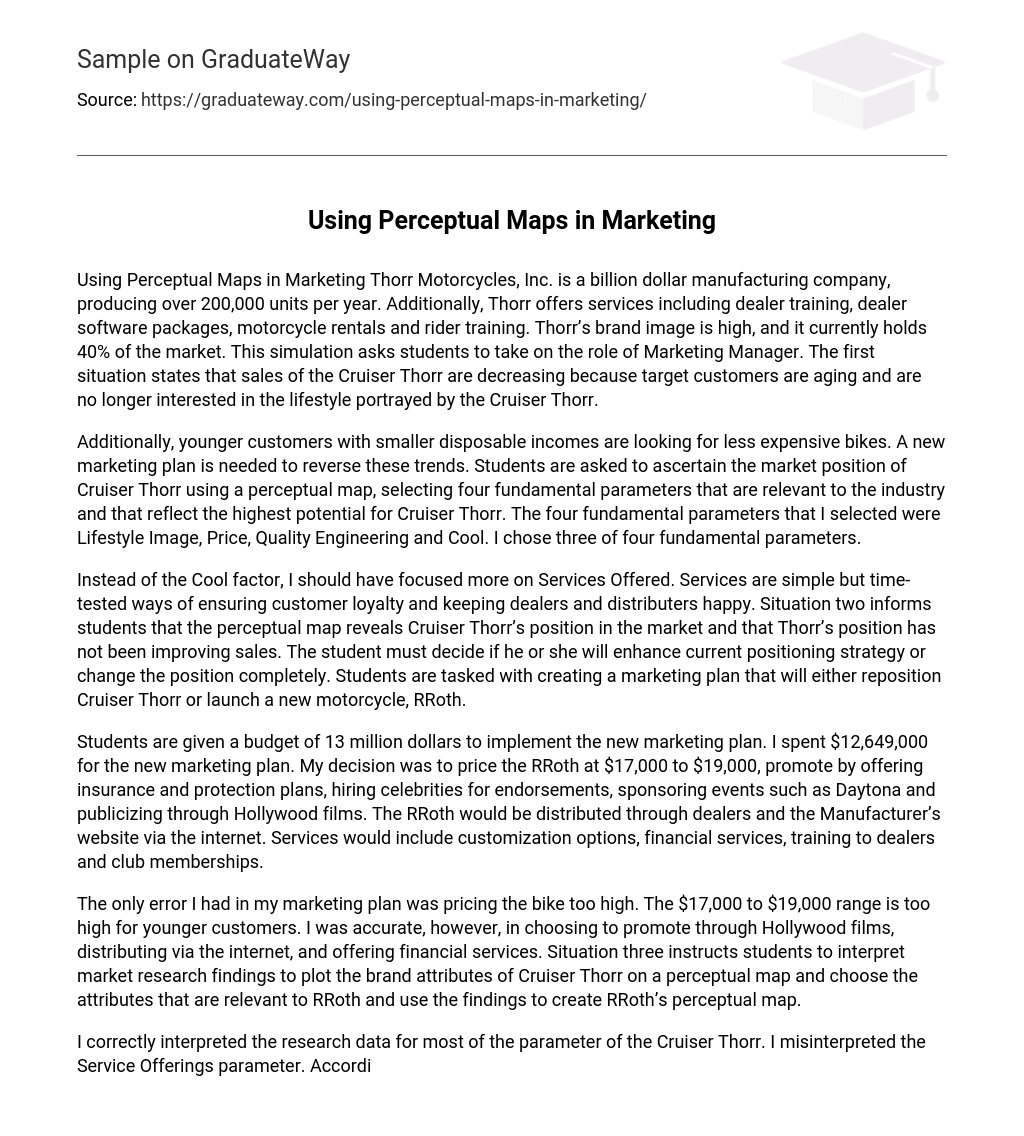Using Perceptual Maps in Marketing Thorr Motorcycles, Inc. is a billion dollar manufacturing company, producing over 200,000 units per year. Additionally, Thorr offers services including dealer training, dealer software packages, motorcycle rentals and rider training. Thorr’s brand image is high, and it currently holds 40% of the market. This simulation asks students to take on the role of Marketing Manager. The first situation states that sales of the Cruiser Thorr are decreasing because target customers are aging and are no longer interested in the lifestyle portrayed by the Cruiser Thorr.
Additionally, younger customers with smaller disposable incomes are looking for less expensive bikes. A new marketing plan is needed to reverse these trends. Students are asked to ascertain the market position of Cruiser Thorr using a perceptual map, selecting four fundamental parameters that are relevant to the industry and that reflect the highest potential for Cruiser Thorr. The four fundamental parameters that I selected were Lifestyle Image, Price, Quality Engineering and Cool. I chose three of four fundamental parameters.
Instead of the Cool factor, I should have focused more on Services Offered. Services are simple but time-tested ways of ensuring customer loyalty and keeping dealers and distributers happy. Situation two informs students that the perceptual map reveals Cruiser Thorr’s position in the market and that Thorr’s position has not been improving sales. The student must decide if he or she will enhance current positioning strategy or change the position completely. Students are tasked with creating a marketing plan that will either reposition Cruiser Thorr or launch a new motorcycle, RRoth.
Students are given a budget of 13 million dollars to implement the new marketing plan. I spent $12,649,000 for the new marketing plan. My decision was to price the RRoth at $17,000 to $19,000, promote by offering insurance and protection plans, hiring celebrities for endorsements, sponsoring events such as Daytona and publicizing through Hollywood films. The RRoth would be distributed through dealers and the Manufacturer’s website via the internet. Services would include customization options, financial services, training to dealers and club memberships.
The only error I had in my marketing plan was pricing the bike too high. The $17,000 to $19,000 range is too high for younger customers. I was accurate, however, in choosing to promote through Hollywood films, distributing via the internet, and offering financial services. Situation three instructs students to interpret market research findings to plot the brand attributes of Cruiser Thorr on a perceptual map and choose the attributes that are relevant to RRoth and use the findings to create RRoth’s perceptual map.
I correctly interpreted the research data for most of the parameter of the Cruiser Thorr. I misinterpreted the Service Offerings parameter. According to the research, Service Offerings were not sufficient or were unsatisfactory prior to our offering a range of services including dealer training, financial services, and customization options. A higher level of seven would have been more appropriate. Regarding the parameters for RRoth, I correctly chose to map Price and Cool.
I should, however, have included Lifestyle and Quality Engineering instead of Service Offerings and Product Design and Styling. I was spot on in rating Price as an eight, but should have increased Cool to a level of eight instead of seven. Differentiation and positioning go hand in hand to determine the success of a product. A company can have a product that stands out among the rest, but without proper positioning, the product will flop. Moreover, if a product is in the right position, but does not stand out among the rest, success will be limited.
A company looking for true success must be unique and position itself as such. In short, the company must penetrate the minds of the buyers and become a leader. Repositioning in the motorcycle simulation was much what I had expected. Sales were decreasing in the current market, and there was no other option but to reposition. In order to spark growth, the company had to target a younger market. Sales were decreasing due to changes in the Product Life Cycle. Cruiser Thorr had reached the stage of decline. In order to enter a phase of regrowth, something new had to be done.
Introducing RRoth for the younger generation sprung an opportunity to reach a new market, while maintaining loyal customers by holding onto Cruiser Thorr. In conclusion, understanding product life cycle and developing an appropriate marketing plan is vital to the success of any product or services. By using a perceptual map, a company can identify opportunities in the market and design its marketing strategies according to those opportunities.





